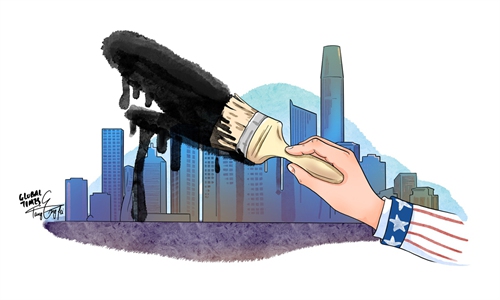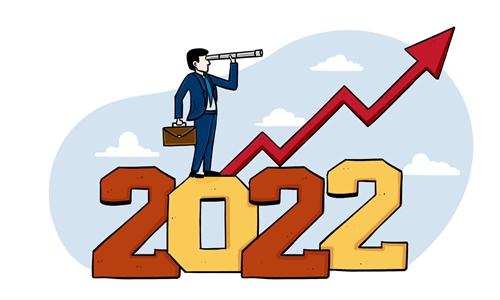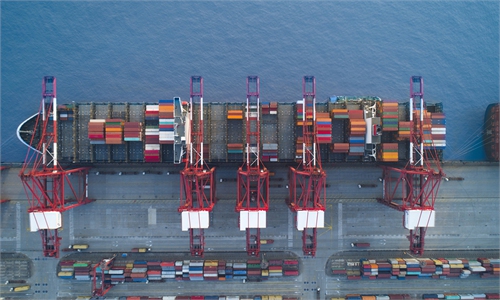Key meeting aims to stabilize Chinese economy next year with proactive policies amid ‘triple pressure’
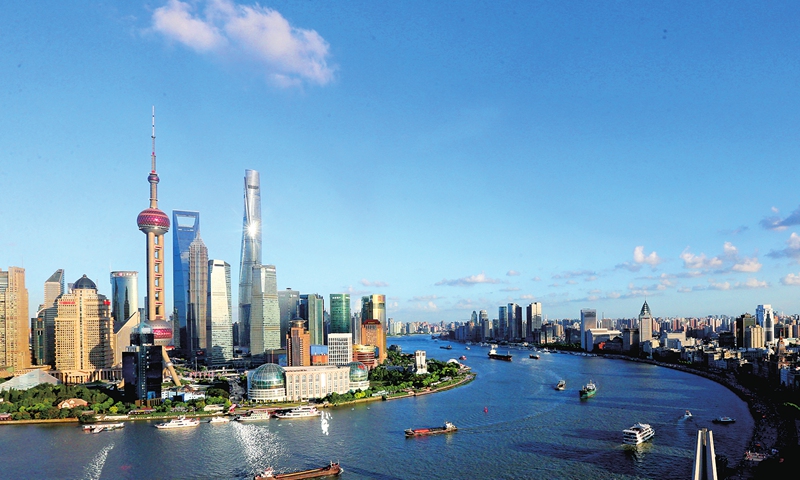
File photo shows a view of the Lujiazui area in Shanghai.Photo:Xinhua
Top Chinese policymakers on Friday put heavy emphasis on economic "stability" to address various challenges for the next year ranging from shrinking demand and supply crunch to downward pressure on economic prospects, at a key meeting that outlines top policy priorities for 2022, signaling the world's second-largest economy is shifting to a more proactive, while prudent, fiscal policy that is expected to prop up a slowing economy amid downward global trend.
In a speech at the closely watched Central Economic Work Conference, Chinese President Xi Jinping reviewed the country's economic work in 2021, analyzed the current economic situation, and set next year's economic work, according to a report from the Xinhua News Agency.
The top leaders commended the achievements in the world-leading economic development and in the battle against the COVID-19 epidemic, while also talking about challenges the country faces, providing a rare window for domestic and global market observers into the Chinese leadership's reading of the world's second-largest economy.
The meeting prioritized stability, a word that was mentioned 25 times according to the Global Times' calculation, for 2022, vowing to improve people's livelihood, stabilize the macro economy, and maintain social stability. It also stressed continuous efforts to deepen reform and opening-up, and adhere to innovation-driven development for high-quality development.
In line with expectations, the meeting stressed a proactive fiscal policy for next year, noting that the policy must improve efficiency and be more faithful with sustainability, in order to ensure the intensity of fiscal spending.
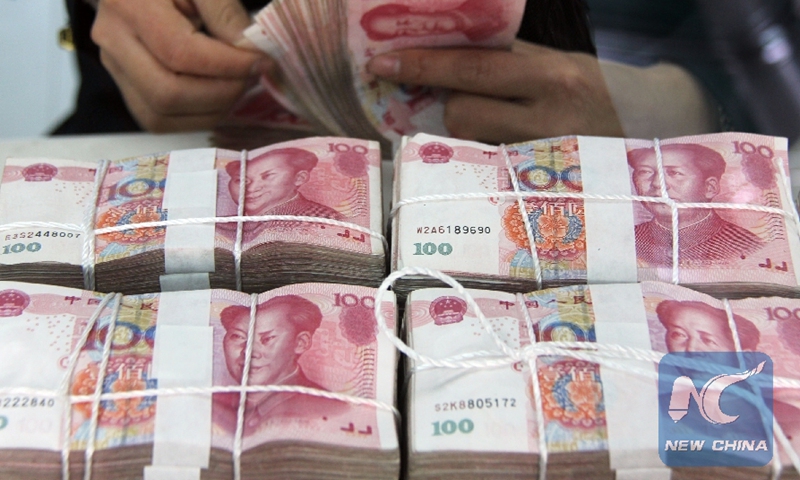
File photo:Xinhua
Seemingly a targeted move to clarify misinterpretations on the country's recent regulatory moves over a range of sectors, the meeting said there will inevitably be various forms of capital in the socialist market economy, and it is necessary to give full play to the positive role of capital, while also effectively controlling its negative role.
China will set "traffic lights" for capital, strengthen supervision of capital in accordance with the law, and prevent the brutal growth of capital, the meeting said.
The meeting also stressed again China's determination to address long-term challenges, such as a shift to clean energy and the crackdown on real estate speculation, but also warned against a one-size-fits-all approach.
For instance, the meeting said that withdrawing traditional energy should be based on the safe and reliable replacement by new energy.
When it comes to the real-estate market, the meeting also called for efforts to explore new development models for the industry such as the development of a long-term rental housing market, promoting the construction of affordable housing, supporting the commercial housing market to better meet the reasonable housing needs of buyers, and promoting a virtuous and stable circle for the industry.
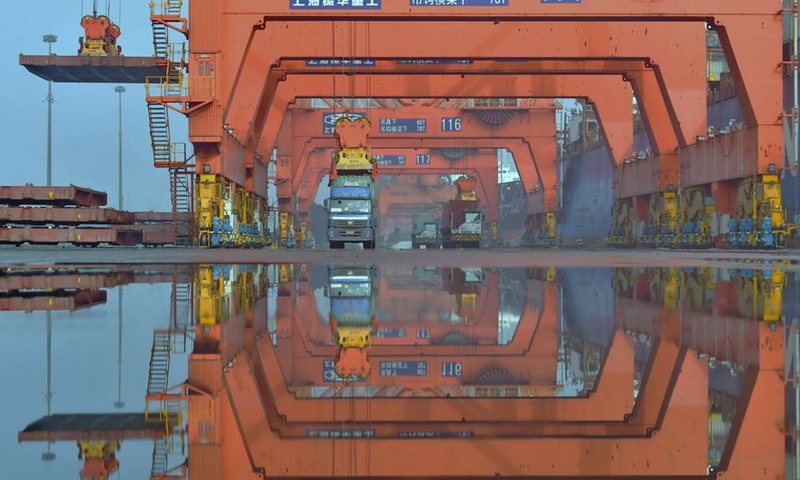
Workers operates crane to load a container at the Jingtang port area of Tangshan Port, north China's Hebei Province, Feb 21, 2020.Photo:Xinhua
Focus on stability
In line with a long-standing tradition, the annual meeting was held from Wednesday to Friday in Beijing this year. This year's event also came after warnings from officials and economists about economic headwinds and stalling growth in the second half.
While fully affirming the achievements in 2021, the meeting specifically pointed out the triple pressure faced by the Chinese economy, namely shrinking demand, supply shocks, and weakening expectations.
The meeting also talked about an increasingly complicated external environment, which has become more complex, severe and uncertain.
No matter how the international situation changes, China must unswervingly do its own thing, continue to strengthen our economic foundation, strengthen technological innovation capabilities, adhere to multilateralism, take the initiative to standardize international economic and trade rules, and promote reforms with high-level openness and high-quality development, said the meeting.
China's annual economic growth will exceed the expected target of 6 percent this year even amid a slowdown in the third quarter. But downward pressure on China's economic growth will be huge next year, Li Chang'an, a professor at the University of International Business and Economics' School of Public Administration, told the Global Times on Friday.
China's GDP expanded 4.9 percent in the third quarter of 2021, slowing from previous quarters amid rising economic challenges including a power crunch and the global supply chain bottleneck. The growth is slightly lower than market expectations, which put it at 5 percent.
In the first three quarters, China's GDP grew by 9.8 percent compared with the same period the previous year to 82.31 trillion yuan ($12.8 trillion).
"In particular, the employment situation will be 'pretty difficult' next year, which poses a great challenge to the country's economic growth," Li said.
In 2022, the number of college graduates in China is expected to be 10.76 million, an increase of 1.67 million. This is also the first time that the number of college graduates would exceed 10 million.
Clarifying confusion
The meeting, which has been a focus to not only China but also the world, fell short of many foreign media's expectations that anticipated a loosened grip on the real estate industry.
Analysts cautioned that the wrong guess is a misinterpretation of China's current situation. Tian Yun, a Beijing-based economist, told the Global Times on Friday that there's no need to exaggerate the indebted Evergrande issue, noting it's the problem of a single company that does not represent the macro situation of the real estate industry, nor will it create systemic risks to the financial system.
Analysts also cautioned that China's proactive policy is a reflection of the philosophy of being "flexible as well as precise," as China's economic conditions, with third-quarter GDP growth heading down, raise the requirements for boosting investment and providing liquidity for the real economy. China has not flooded the market or over-stimulated the economy by increasing money supply, meaning that the monetary policy is still stable, they said.
China's roll-out of a more proactive fiscal policy comes at a time when the US is speeding up its tapering, which shows that China's monetary policies are "centered on its own needs" instead of "dancing with others."
Tian mentioned that the external market is a very strong driving force for China's economy. Without any stimulus next year, China's economic growth rate can still surpass 5 percent.
Next year, China can still have sufficient confidence and tools to ensure the steady growth of the economy, Tian noted.
